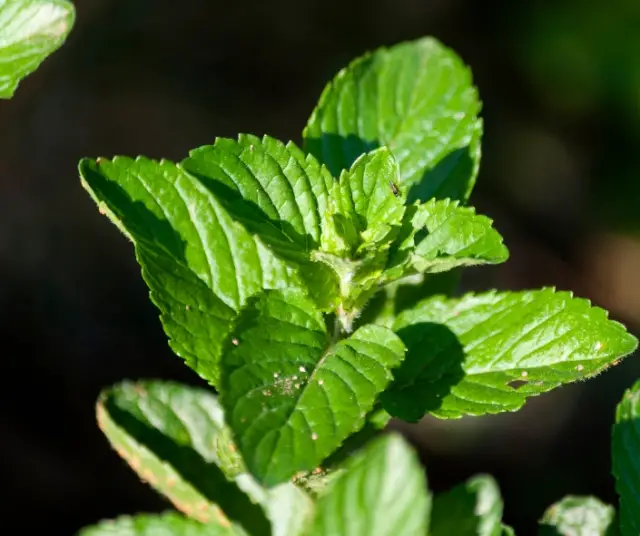Spearmint, scientifically known as Mentha spicata, is an aromatic plant that has been used for centuries for its numerous health benefits and its versatility in cooking and traditional medicine. Originally from Europe and Asia, this plant belongs to the mint family and has spread throughout the world due to its medicinal properties and its pleasant aroma and flavor.
Digestive Properties
One of the most notable properties of spearmint is its ability to relieve digestive problems. Consuming spearmint tea can help relieve symptoms of indigestion, gas, and bloating. Its carminative action helps relax the muscles of the digestive tract, which facilitates the expulsion of gases and relieves stomach discomfort. In addition, peppermint can stimulate the production of bile, which promotes the digestion of fats.
Headache Relief
Another well-known benefit of spearmint is its ability to relieve headaches and migraines. Peppermint essential oil contains menthol, which has analgesic and anti-inflammatory properties. Applying a small amount of peppermint oil to your temples can provide quick and effective headache relief. Additionally, inhaling the refreshing aroma of spearmint can help relieve tension and relax tense muscles.
Antimicrobial Properties
The antimicrobial properties of spearmint are one of its most notable and beneficial aspects. This attribute is derived from the presence of active compounds in the plant, especially in its essential oil, which have been shown to have a powerful action against a wide variety of microorganisms, including bacteria and fungi.
Peppermint essential oil mainly contains menthol, a compound known for its antibacterial and antifungal properties. Menthol works by interfering with the growth and reproduction mechanisms of microorganisms, making them less able to proliferate and cause infections.
This antimicrobial activity makes spearmint useful in a variety of situations. For example, it can be applied topically to minor cuts and wounds to prevent infection and promote faster healing. In addition, its application on the skin can help treat skin conditions such as acne and dermatitis, by fighting the bacteria and fungi that contribute to their development.
Improves Breathing
The menthol present in peppermint provides a refreshing and decongestant effect that can help improve breathing, especially in case of colds, nasal congestion and respiratory problems such as asthma. Inhaling hot water vapor with a few drops of peppermint essential oil can open the airways and relieve nasal congestion, making breathing easier. Additionally, the refreshing aroma of spearmint can help relieve fatigue and improve mood.
Antioxidant Properties
Peppermint is rich in antioxidant compounds such as flavonoids and phenolic acids, which help protect cells from damage caused by free radicals and reduce the risk of chronic diseases such as cancer and heart disease. Regularly drinking spearmint tea or adding fresh leaves to salads and other dishes can help increase antioxidant intake and promote overall health.
Relieves Stress and Anxiety
The fresh, calming aroma of spearmint has a relaxing effect on the body and mind, making it an effective natural remedy for relieving stress and anxiety. The aroma of spearmint can help calm nerves, reduce muscle tension and promote relaxation. Drinking a cup of peppermint tea or adding a few drops of peppermint essential oil to your bath can help relieve stress and improve your mood.
Promotes Oral Health
Peppermint is not only known for its freshness and versatility in the kitchen, but also for its exceptional oral health benefits. Its oral health-promoting properties are derived mainly from its content of menthol and other active compounds in its essential oil, which have antibacterial, anti-inflammatory and refreshing properties.
First of all, the menthol present in spearmint helps fight bacteria that cause bad breath and contribute to the formation of dental plaque. By reducing the amount of bacteria in the mouth, spearmint can help maintain fresh breath and prevent oral health problems such as gingivitis and periodontal disease. In addition, the anti-inflammatory action of spearmint can help soothe and relieve inflammation of the gums, thus reducing the risk of bleeding and sensitivity. This can be especially beneficial for those who suffer from sensitive or swollen gums due to plaque buildup or periodontal disease.
Another benefit of the herb for oral health is its ability to freshen breath naturally. Chewing fresh spearmint leaves or rinsing your mouth with a spearmint infusion can help neutralize unpleasant odors and leave your mouth feeling fresh.
Supports Weight Loss
Peppermint can be a useful ally in your weight loss efforts. Consuming spearmint tea can help suppress appetite, increase feelings of satiety, and improve digestion, which can contribute to more effective weight loss. Additionally, the refreshing aroma of spearmint can help reduce food cravings and prevent snacking between meals.
How to Incorporate Good Herb into Your Daily Routine
There are many ways to incorporate spearmint into your daily life and take advantage of its health benefits:
- Prepare spearmint tea by adding fresh or dried leaves to hot water and letting them steep for a few minutes.
- Add fresh mint leaves to salads, sauces, stews and meat or fish dishes to give them a fresh and aromatic touch.
- Use spearmint essential oil in diffusers to enjoy its relaxing aroma in your home or office.
- Apply diluted spearmint oil to the skin to relieve muscle and joint pain, as well as improve skin health and fight infections.
Incorporating spearmint into your daily oral care routine can help you maintain a bright, healthy smile in the long term.
